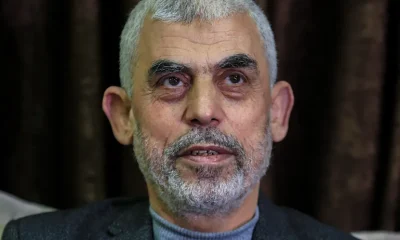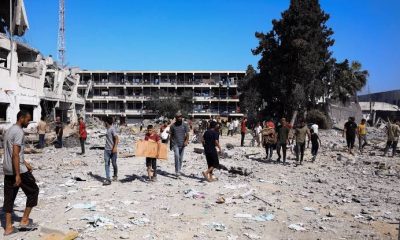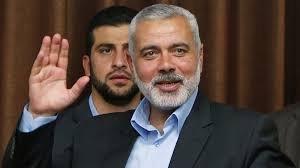
Foreign
Hamas Leader Yahya Sinwar Killed in Gaza Offensive

iexclusivenews – In a seismic development that could reshape the landscape of the Israel-Hamas conflict, Israeli forces have reportedly killed Yahya Sinwar, the top leader of Hamas in Gaza.
This critical turn of events comes as the war approaches its grim one-year anniversary, marking a potential inflection point in the ongoing hostilities.

Yahya Sinwar: The Mastermind Behind Hamas
Yahya Sinwar, a name that has become synonymous with Hamas’ militant operations, emerged as a pivotal figure in the organization’s leadership following the death of his predecessor, Ismail Haniyeh.
Born in 1962 in the Khan Younis refugee camp, Sinwar’s life was intrinsically linked to the Palestinian struggle from an early age.
Rising through the ranks of Hamas after its formation in 1987, Sinwar quickly gained notoriety for his hardline stance and strategic acumen.

His role in orchestrating the October 7, 2023, attack on Israel – an event that ignited the current conflict – cemented his position as a primary target for Israeli forces.
The Confirmation and Its Implications

Israel’s Foreign Minister has officially confirmed Sinwar’s death, describing it as a “military and moral achievement for the Israeli army.”
This announcement has sent shockwaves through both regional and international political spheres, with many viewing it as a potential catalyst for change in the protracted conflict.
The circumstances of Sinwar’s death remain partially shrouded in mystery.
Reports suggest he was killed in Rafah after an Israeli tank launched a shell at a building, causing it to collapse.
Notably, Israeli soldiers were not specifically searching for Sinwar at the time, encountering him during a routine patrol.
International Reactions and Diplomatic Ripples
The news of Sinwar’s death has elicited responses from world leaders, reflecting the global significance of this development:
U.S. President Joe Biden likened the event to the killing of al-Qaida leader Osama bin Laden, calling it a “good day for Israel, the United States, and the world.” Biden expressed hope that this could pave the way for the release of Israeli hostages and an end to the war.
Democratic presidential nominee Kamala Harris viewed the event as an opportunity to “finally end the war in Gaza,” emphasizing the need for a solution that ensures Israel’s security while addressing Palestinian rights.
NATO Secretary-General Mark Rutte condemned Sinwar, stating that “every reasonable soul in the world” had condemned the October 7 attacks, adding, “So if he has died, I personally will not miss him.”
Impact on Hamas and the Conflict Dynamics
The death of Yahya Sinwar leaves a significant leadership vacuum within Hamas. The organization now faces the challenge of succession, with uncertainty surrounding who will take the reins and how this transition might affect ongoing cease-fire efforts and the overall trajectory of the conflict.
Israeli Prime Minister Benjamin Netanyahu framed Yahya Sinwar’s death as settling an account with “the person who carried out the worst massacre in the history of our people since the Holocaust.”
However, Netanyahu was quick to add that the war “has not yet ended,” indicating that Israel’s military operations in Gaza are likely to continue.
Humanitarian Crisis and Regional Toll
As the conflict persists, the humanitarian situation in Gaza and the broader region continues to deteriorate:
Recent reports indicate that the death toll in Lebanon due to the conflict has surpassed 2,400, with over 11,000 wounded.
The fighting has displaced 1.2 million people, including more than 400,000 children, according to UN estimates.
In Lebanon, 77% of public schools are reportedly out of service, either being used as shelters or located in areas directly affected by the war.
The crisis has led to a significant movement of people across the Lebanon-Syria border, with hundreds of thousands of Syrian and Lebanese citizens crossing into Syria between September 23 and October 17.
Legal and International Criminal Court Implications
The International Criminal Court (ICC) had previously requested an arrest warrant for Yahya Sinwar for his role in the October 7 attacks.
With reports of his death, the ICC’s prosecution office has stated it is “aware of the reports” and will take relevant action if sufficient information confirming his death is received.
This could potentially lead to the withdrawal of the arrest warrant application.
Looking Ahead: Uncertain Future
While the death of Yahya Sinwar marks a significant milestone in Israel’s campaign against Hamas, its long-term impact on the conflict remains to be seen. Key questions loom:
- Who will succeed Sinwar, and how will this affect Hamas’ leadership structure and strategy?
- Will this development lead to increased pressure for a ceasefire or potentially escalate the conflict?
- How will this impact ongoing hostage negotiations and potential prisoner exchanges?
- What role will international mediators play in the aftermath of this event?
As the situation unfolds, the international community continues to call for a peaceful resolution that addresses the security concerns of all parties involved while prioritizing the welfare of civilians caught in the crossfire.
The coming weeks will be crucial in determining whether Yahya Sinwar’s death will serve as a catalyst for peace or a prelude to further violence in this long-standing conflict.




























